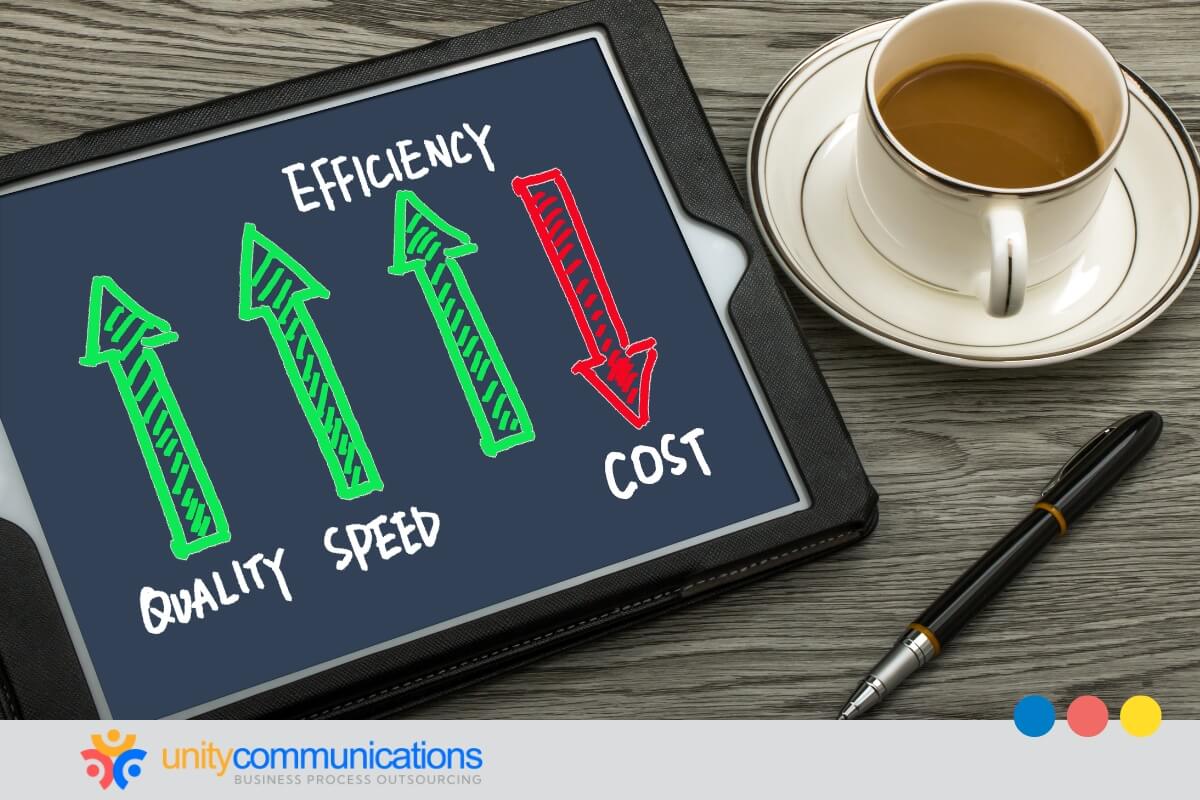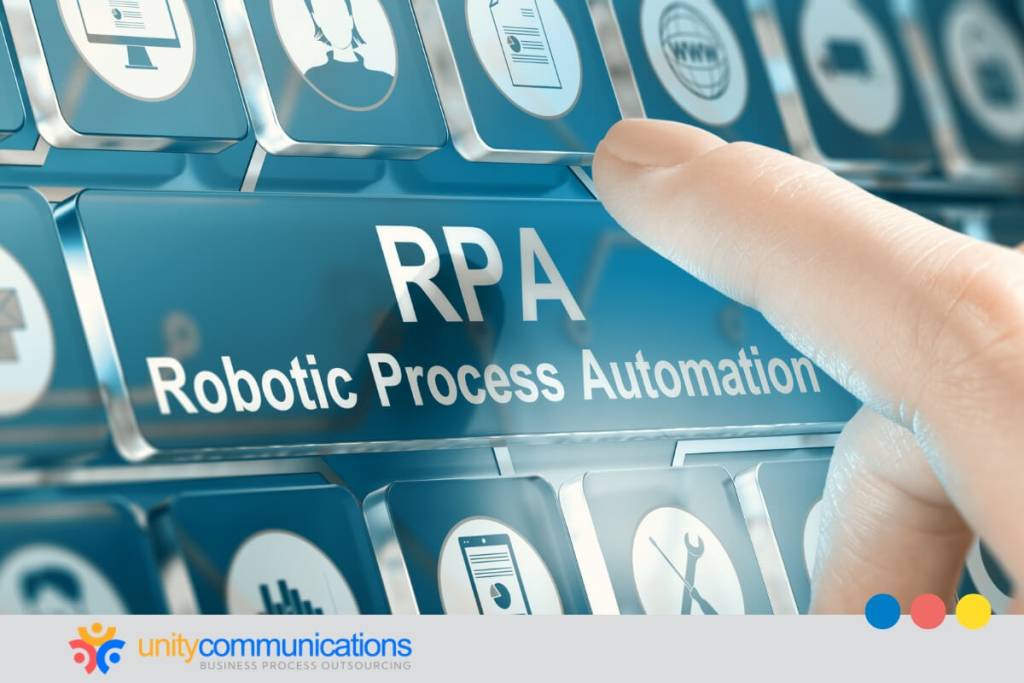IN THIS ARTICLE
Table of Contents
Robotic process automation (RPA) is a cost-effective solution to speed up repetitive, rule-based tasks. This technology lets your team prioritize more pressing work by avoiding the burden of dealing with non-core functions.
However, RPA platforms require sufficient time and resources to function correctly. They need a dedicated team to ensure smooth operations and secure data processes.
Many companies rely on business process outsourcing (BPO) to achieve such goals. This article discusses how BPO assists in attaining undisrupted RPA software implementation. Read on to learn more.
Reasons Companies Need RPA Software

Amid the fast-paced market competition, enterprises of all sizes constantly explore ways to enhance operational efficiency and gain significant cost savings. They aim to deliver a superior customer experience while optimizing business operations.
RPA technology helps companies reach those targets. According to Deloitte’s recent data, organizations that enabled business process automation in 2022 experienced an average cost reduction of 32%. They also benefited from increased productivity and improved accuracy.
Although RPA does not require physical equipment, it remains costly due to needed software components, miscellaneous expenses, and related processes. Blueprint estimates that a single bot costs between $5,000 and $15,000. While the initial licensing only accounts for 25–30% of RPA software’s cost, the other 75% goes to the following:
- Annual license renewal fees
- Subject matter expert recruitment and hiring
- Implementation consulting expenses
- Infrastructure setup
- System maintenance and updates
Allocating separate funds for each item is expensive and can overshadow resources for growth-focused initiatives. Fortunately, BPO companies offer affordable service packages for RPA software implementation.
In addition to reduced costs, service providers offer access to skilled professionals and advanced technologies. They use these capabilities to boost RPA-based workflows and only charge hourly, annual, or break-fix fees.
How BPO Supports RPA Software Implementation

Outsourcing lets businesses harness the full potential of automation while maintaining cost-effectiveness. Working with a service provider for RPA adoption gives you a competitive edge as you strive for innovation and continued expansion. What is a BPO company’s role in RPA software implementation? Keep reading.
Assess Operational Challenges and Automation Needs
Third-party teams help assess your current pain points to know how to better address your automation needs. They work with your executives and core units for brainstorming, process mapping, and data analysis. Their five-step assessment phase involves the following:
- Understand business targets for RPA rollout. BPO firms assist you in clarifying your short-term and long-term automation goals. This step ensures that your RPA strategy resolves immediate issues and supports your overarching business strategy.
- Evaluate the enterprise technology landscape. Service vendors examine your existing information technology (IT) ecosystem to verify its compatibility with the RPA software. This effort ensures the seamless integration of your acquired automation solutions.
- Determine risky and time-consuming functions. The latest statistics show that 82% of breaches involved human-made database misconfigurations and input mistakes. Third-party vendors identify tedious tasks prone to human error to avoid similar blunders.
- Identify potential challenges to RPA implementation. Providers are adept at addressing potential automation risks, such as cyber threats and system interruptions. They identify these issues during the evaluation stage to inform your mitigation plans.
- Conduct a comprehensive cost-benefit analysis. This action includes calculating the upfront and maintenance costs of adopting automation solutions. It helps pinpoint possible returns on your RPA investment.
Formulate RPA Strategies
Service providers support your digital transformation efforts by helping formulate a well-structured RPA roadmap. They use the insights they have collected during the assessment stage to draft a strategy for efficient RPA optimization.
To achieve scalability, BPO vendors break down the RPA software implementation plan into manageable phases based on complexity, urgency, and dependency. The phased approach also covers these activities to ensure success:
- Establish clear criteria for process prioritization. Providers help enumerate which business functions require automation. They consider transaction volume, cost reduction potential, and customer experience.
- Choose the right RPA tools for scalability. BPO teams guide you in selecting technologies that help achieve operational flexibility. They ensure these solutions match your existing systems and capabilities.
- Examine and pick the skills and expertise required for RPA adoption. This step includes identifying in-house and BPO roles and responsibilities involved in the project. It enables proper resource allocation for smooth RPA deployment.
- Develop a governance framework for RPA software optimization. BPO companies collaborate with their executives to create policies and procedures for implementation. These guidelines include standards for automation development and steps to ensure legal compliance.
Install and Configure RPA Software
After setting the roadmap, BPO companies help install and configure your chosen RPA software. The third-party team examines your current system and network environment to ensure compatibility with the RPA platform.
Deploying and customizing the RPA software based on your unique needs comes after the evaluation. This process involves defining workflows, setting up algorithmic rules, and integrating the solution into your enterprise systems.
Third-party vendors perform thorough testing and quality assurance before deploying the RPA solution in your live business environment. They conduct test scenarios to validate the accuracy and efficiency of automated processes. This stage also helps identify and address potential challenges in the system beforehand.
Furthermore, the BPO unit assists in migrating your relevant data to the RPA environment. They use artificial intelligence (AI) and machine learning (ML) tools to perform the transfer securely. These tools ensure the RPA software can access the information required to automate repetitive tasks, such as data entry, customer service, and IT support.
Conduct Software Maintenance and Updates
Part of BPO’s role in RPA software implementation is to provide maintenance and updates. This post-deployment assistance helps track and locate system anomalies, errors, or inefficiencies in real time.
Through online technical support and remote access control, the third-party team monitors and troubleshoots the root causes of your RPA software’s flaws. Their work may include resolving data discrepancies, optimizing automation workflows, or reconfiguring drivers.
Besides, providers strengthen your software security by implementing regular updates and patches. These upgrades enhance encryption protocols, access controls, and multifactor authentication strategies.
Maintaining your platform also involves ensuring compliance with industry-specific and regulatory rules. The BPO team performs regular system audits to identify which areas impede your adherence to legal requirements, such as the International Organization for Standardization (ISO) 27701 certification. They then formulate an actionable resolution strategy.
The Bottom Line

Leveraging an RPA platform requires significant time, effort, and resources to boost your operations. Service providers deliver such necessities and help achieve your efficiency goals at competitive pricing.
BPO companies address everything from assessing your current capabilities to actual RPA software implementation, helping you alleviate the burden of handling repetitive tasks. They also ensure your system remains in good condition by providing continuous maintenance and upgrading services.
Let’s connect if you need further details on a BPO company’s possible contribution to your RPA adoption. Unity Communications has a wealth of resources to satisfy your curiosity. The award-winning provider also employs a dynamic talent pool and modern technology to deliver technical assistance for your RPA rollout.





